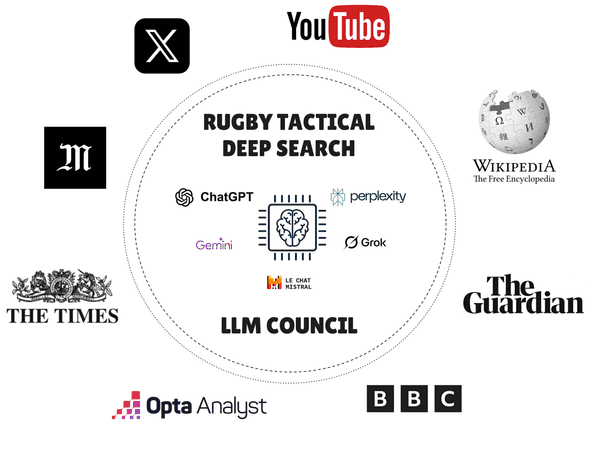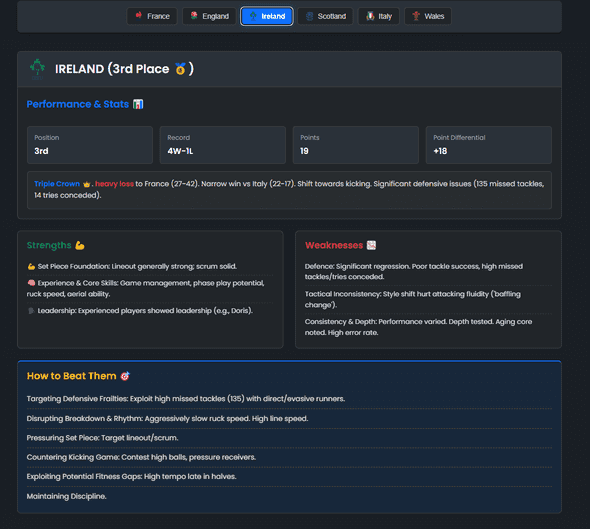Winning the Next Rugby Game with an LLM Council
April 02, 2025
Since the advent of large language models and conversational tools like ChatGPT in November 2022, I’ve been asking myself: Can AI tools actually help win games?
Early versions faced limitations such as restricted web access, knowledge cutoffs, and susceptibility to generating inaccurate information. But now, with a new generation of language models equipped with deep search capabilities, enhanced reasoning, and multimodality, the game has truly changed.
The LLM Council: A New Era of Tactical Analysis
Imagine having a council of top-tier AIs—ChatGPT, Gemini, Claude, Perplexity, Le Chat, and Grok—each bringing unique strengths to the table. This isn’t just about comparing notes; it’s about harnessing their collective wisdom to craft game-winning strategies. Inspired by Andrej Karpathy’s idea of LLM Council, we analyzed the Men’s 2025 Six Nations Rugby Championship by posing the same tactical questions to multiple models:
- Team Performance and Key Statistics: A summary of how the team is performing.
- Strengths and Weaknesses: Detailed insights into game strategy, kicking precision, lineout execution, defensive robustness, attacking flair, and disciplinary issues.
- Opportunities for Victory: A list of suggestions of how to outsmart the opposition.

The Starting Five: Selecting Our Star LLMs
1. ChatGPT
We activate Search to pull real‑time information from the web and provide responses that include source citations, and Reason to break down complex questions, which lets the model generate multi‑step, logical explanations and creative outputs.
2. Perplexity
Perplexity offers two interesting options: Deep Research Iteratively searching hundreds of sources and reconciling data to produce comprehensive analyses. Pro Search Providing well-cited answers, making it ideal for professional-level inquiries.
3. Gemini
We used Gemini 2.5 Pro Experimental that comes with enhanced reasoning and we activated Grounding with Google Search to ensure context-aware, accurate responses.
4. Grok
Grok stands out for having access to sources like X posts and accounts. It also offers two options: DeepSearch Provides rapid access to a wide array of information. It’s perfect for quick, broad sweeps. DeeperSearch Focuses on high-quality sources to deliver more reliable insights, even if it might not cover every angle.
5. Le Chat
We set up Le Chat with Web search tool to ensure that its tactical insights reflect the most current data available.
Note: For this project we only used the free plans. Most of the tools offer some advanced capabilities as a preview, but others do not. At the time of writing, Claude web search was not available for free plans.
Bringing It All Together: Battlecards
After collecting detailed reports from each model, we asked one of the trusted LLMs to summarize the findings into actionable insights. To streamline access, we built a web app displaying team battlecards with concise summaries of opponents’ strengths, weaknesses, and opportunities. This dynamic dashboard helps coaches quickly compare teams, spot trends, and refine strategies.
The app with full results is available here.

Data Sources
The LLM Council draws insights from diverse rugby information sources, including YouTube videos, X posts, post-match press, specialized rugby publications, like Opta Analysis or RugbyPass. This powerful combination of statistical data with qualitative insights from expert commentary in multiple languages enables a comprehensive tactical analysis that human analysts might miss when working independently.
The varied approaches and sources explored by these tools offer a multi-faceted view: each tool seems to use some preferred data sources in its results, so the LLM Council method not only diversifies the analysis but also adds a layer of robustness to strategic decision-making.
Data Integrity Risks
When utilizing AI for rugby analysis, teams must remain vigilant about data integrity threats. Misinformation, outdated statistics, and potential data poisoning can lead to flawed results. Teams should maintain human oversight and implement cross-verification protocols across multiple models and sources.
Conclusion
By using these insights as a foundation, coaches can validate these ideas against real performance data, and craft a game plan that leverages the latest in AI-driven analytics. The future of sports strategy might just lie in this fusion of human intuition and machine intelligence.
In the world of competitive rugby, every advantage counts. Stay tuned as we continue to explore the cutting edge of AI in sports and beyond.